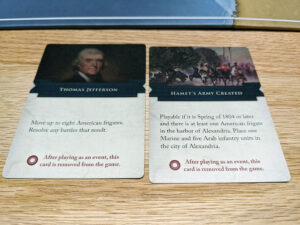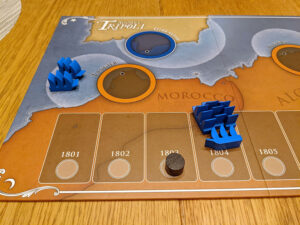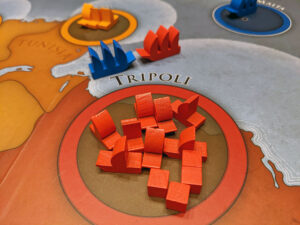 If it looks like a GMT game, and it plays like a GMT game, maybe it’s a GMT game? I’m kidding of course, but that’s the first thought that arises upon cracking open The Shores of Tripoli, the first release from new publisher Fort Circle Games. Shores of Tripoli is a 1-2 player asymmetrical card-driven war game by Kevin Bertram that tells the story of the Barbary Wars, a conflict between the fledgling United States (and ally Sweden) and Barbary states of Tripoli, Tunis, Morocco, and Algiers. One player takes on the role of the US navy, while the other plays as the Tripolitan pirates.
If it looks like a GMT game, and it plays like a GMT game, maybe it’s a GMT game? I’m kidding of course, but that’s the first thought that arises upon cracking open The Shores of Tripoli, the first release from new publisher Fort Circle Games. Shores of Tripoli is a 1-2 player asymmetrical card-driven war game by Kevin Bertram that tells the story of the Barbary Wars, a conflict between the fledgling United States (and ally Sweden) and Barbary states of Tripoli, Tunis, Morocco, and Algiers. One player takes on the role of the US navy, while the other plays as the Tripolitan pirates.
It claims a 45-60 minute playtime, which is actually fairly accurate. And that is part of the appeal of this game. It can be set up and played, reset for a rematch, and played a second time, all in the span of probably 90 minutes to 2 hours, especially once the fairly straightforward teach is out of the way.
Gameplay Overview:
Fans of GMT games such as Twilight Struggle, Here I Stand, the newer Red Flag Over Paris, and even streamlined versions of those card-driven games, such as Capstone’s Watergate, should feel very familiar with the main mechanic of Shores of Tripoli. Discard a card for a generic action, or play it for the more powerful event, and potentially remove the card from the game. The US player’s generic action adds more ships or moves existing ships, while the Tripolitan player’s generic actions include reinforcing harbors or going on pirating raids. The game is played over a series of years (1801-1806), split into 4 seasons. Each season represents one turn by each player. Once each player has had 4 turns, the year marker advances, and each player draws 6 cards.

One of the elements of Shores of Tripoli that is appealing (to me at least) is the asymmetrical victory conditions for each side. The US wins if it is able to accomplish one of the following conditions: 1) Achieve the conditions required to play a card called The Treaty of Peace and Amity, which can only be played towards the end of the game and with a pretty specific set of requirements, or 2) capture Tripoli in an all-out battle via a card called Assault on Tripoli.
The Tripolitan player, on the other hand, has a few more options: 1) Acquire 12 gold pieces through pirate raids, 2) sink 4 US frigates, or 3) eliminate the US ground forces in one of three land battles that could take place over the course of the game. If any of the Tripolitan win conditions are met, the game ends immediately.
Battles are played out through a significant amount of dice chucking. The condition to land a hit on an enemy boat or ground force is to roll a 6, and that’s consistent throughout the game (aside from the occasional use of battle cards that might improve a player’s odds). The one time a 6 is not required is during pirate raids, which hit on a 5 or 6. So while there’s obviously luck involved in combat and in raiding, your chances are never particularly favorable. It’s hard to hit a moving target, y’all!

Game Experience:
My first time playing Shores, I’ll admit I was not bowled over. Actually, I’m still not bowled over, but I will say that with each successive play, my opinion of the game has improved. My first play was as the US navy, and, as the rulebook’s “Basic Strategy” section points out (and I purposefully did not read prior to playing so as to come upon the strategy on my own), the early game for the US can be tough, especially if your initial handful of cards pertain largely to ground combat, which is not something that can actually happen until 1804 (4 rounds into the game). So my initial impression was that this game was very luck-dependent based on your initial draw. My opponent immediately had a series of successful raids, acquiring numerous gold coins before I had a significant chance to respond, and the game was over before we even hit the midway point of the game, as he successfully accumulated 12 coins.

After my second play (this time as Tripoli), certain elements started to come into focus, and I realized that the US early game is more about triage. It’s very easy to let the Tripolitan player start to run away with the game via pirating, so blockading the port of Tripoli as early as possible to discourage it is crucial. For the Tripolitan player, the ideal early draw is to activate your allies in Morocco, Algiers, and Tunis. If you draw the cards that allow those allies to declare war on the US in your first hand, allowing you to place ships in their docks, you’re in pretty good shape to win as the dam begins to burst for the US player.
Alternately, if you only draw cards that allow you to raid from those allied ports prior to getting the cards that actually activate them and load them with vessels, you’ve essentially been given bullets without a gun. So while the luck of the draw can deeply define the early game for both players, repeated plays made it clear that neither feels totally insurmountable (only kinda insurmountable!). Luckily, the game is short enough to make you not care too much if your start tanks your game.

The battle rules of the game are fine, there’s really not much to say about it. Naval battles (which occur in ports) last one round, after which all the US navy ships involved retreat to Malta. The interesting decision for the US player in this circumstance is whether or not to leave the patrol zones empty when attempting to hobble the Tripolitan fleet with a naval battle, as it could open up an opportunity for a big pirate raid if it fails to knock out any of their ships.
The card events are really where the meat of the game is. Many crucial moves by each player can only occur via specific cards, so it starts to become imperative, if you intend to play this game competitively, to familiarize yourself with both your own deck and the opposing player’s deck. Luckily, this is not that hard, as the decks are very manageable in size. After three plays, I had a pretty good idea of which cards I really had to watch out for on both sides, and what conditions were required for a US win via the The Treaty of Peace and Amity card. The relatively small decks of cards are both one of the appealing elements of the game, and perhaps one of its drawbacks. The game’s devotion to its historical context leads the players down a specific narrative path, which removes the potential for more sandbox-y game experiences. It makes me question the game’s replay value. But simultaneously, it does give repeat players the opportunity to try to outwit each other with their robust knowledge of what is likely to come next.

Finally, I think the presentation, especially for a first-time publisher, is quite solid. The box construction is high quality, the wooden boats are appealing, the large wooden gold coins satisfying. The board’s map art is fine, nothing remarkable, but functional. I did very much appreciate that, upon opening the box for the first time, I was greeted with a reproduction of an actual letter from Thomas Jefferson to Yusuf Qaramanli, the Pasha (or military leader) of the Tripolitan forces. In addition to the rulebook (which is well-written and clear), there’s another historical supplementary booklet, which tells the story of the first Barbary Wars, includes designer notes, and suggested additional reading for those interested in this somewhat obscure moment in history. All these elements add to a largely enjoyable gaming experience.
Final Thoughts:
The Shores of Tripoli is a solid and fairly streamlined card-driven game. I’m not, by nature, a wargamer, though I do fall more into the omnigamer lane, so I’m never averse to playing anything (except maybe CCGs). I’ve enjoyed, though never become enamored with, GMT’s card-driven war games or COIN games. Many of those games can feel quite intimidating, especially to casual games. The Shores of Tripoli offers an inviting rendition of this style of gaming, and is short enough to prevent that glazed dead-eyed look that may be staring back at you if it were a longer commitment and your gaming partner has realized that they’ve made a terrible mistake.
The biggest faults I can find in the game are simply that, while I found it enjoyable, I didn’t find it terribly exciting, and I question the replay value of it, due in large part to the fairly locked-in, narrative direction of the game. The most exciting thing about Shores of Tripoli, to me at least, is the quality from Fort Circle Games’ first outing. They dove headlong into the waters of game publishing and didn’t come out with a tepid and ugly game. If they maintain the quality control they clearly exercised for The Shores of Tripoli, both with its gameplay and presentation, we have good things to expect from them in the future
Final Score: 3.5 Stars – An easy entrée into the world of card-driven wargames and a solid first salvo from new publisher Fort Circle Games.
 Hits:
Hits:
• Short playtime
• Simply rule-set for a card-driven wargame
• Solid and thoughtful presentation
Misses:
• Combat is a bit lackluster
• Order in which cards are drawn impact start of the game
• Replay balue is a question
Source: Board Game Quest





